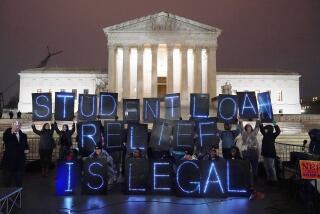Brazil, Gasping to Avert Crisis, Raises Taxes
Confidence in Brazil’s fragile economy is plummeting once again and investors are fleeing the country, developments that prompted the government to impose emergency tax hikes Wednesday to slash an ominous budget deficit.
President Fernando Henrique Cardoso, whose country is seen as the next potential domino in the global economic crisis, acted on the eve of a make-or-break special session of the National Congress called to enact crucial fiscal reform measures.
Brazil’s recovery seemed assured in November when it was promised a $41.5-billion rescue package orchestrated by the International Monetary Fund. The money was meant to bolster Brazil’s depleted foreign reserves and stave off the threat of a devaluation.
But key Cardoso fiscal reforms--demanded by the IMF in return for the bailout funds--suffered setbacks Dec. 2. Since then, the daily outflow of foreign funds has doubled, draining about $5 billion from Brazil’s foreign reserves.
The nation still has about $44 billion of reserves on hand, so no devaluation is imminent. But the fresh uncertainties underscored the high stakes surrounding the political reform battles in Brazil.
“If the government had not done this, it would have left us in a very dangerous position,” said Marcelo Borges, who manages a $50-million equity fund at Tudor Asset management in Sao Paulo. “It could have put us back five years in growth terms and brought a run on our currency.”
Trouble in Brazil, which is believed to already be in recession, could unleash a whole new round of global volatility. A devaluation also would diminish Brazilians’ purchasing power, undercutting U.S. exports. Brazil bought $16 billion in U.S. products last year, making it the 11th-largest foreign destination for American goods.
And as Latin America’s largest economy, a collapse in Brazil would imperil such so-far healthy economies as those of Argentina and Chile. It also would probably spur fresh fears about other emerging markets around the world that have remained vulnerable during the 18-month Asia crisis.
Austerity measures that Cardoso has already imposed to deal with the crisis will cause Brazil’s economy to shrink in 1999 by 2% to 4%, economists predict.
The IMF bailout highlighted Brazil’s importance in the global economic scheme of things. But it came with strings attached, requiring Brazil to get its fiscal house in order--specifically to rein in runaway government spending that this year will produce an 8% fiscal deficit.
So far, Brazil has received $9.3 billion of the money, with the rest coming only if it meets contingencies. But on Dec. 2, Cardoso lost a major test when Congress voted down proposals to tax social security beneficiaries and to raise payroll contributions to social security by government employees.
“The losing vote earlier this month was a major disappointment,” said Sergio Goldman, head of research at Santander Investments in Sao Paulo.
Moreover, the government has admitted defeat on another key element in its deficit-reduction strategy, saying it was giving up hope of a January hike in the transaction tax on each check and ATM withdrawal. Cardoso wants to raise the fee from 0.2 cent to 0.38 cent per transaction. Finance Minister Pedro Malan said Wednesday that measure was unwinnable and may be postponed until March at the earliest.
Such defeats have shaken confidence, causing Brazilians and foreigners alike to cash out in droves. Brazil’s foreign reserve losses are running an average of $245 million a day in December, double the rate last month when the rescue package was thought to have given Brazil a new lease on life. Capital flight hit $993 million on Monday, the largest loss since September, and raised red flags high.
Brazil’s main Sao Paulo stock market index lost 6.6% on Monday and Tuesday before recouping slightly Wednesday in extremely light trading.
The failure of the two reform measures and deterioration in the markets prompted the emergency tax measures Wednesday. Brazil said it would raise $5.6 billion by eliminating certain tax deductions, broadening investment tax eligibility, and accelerating collection of proceeds from the privatization in July of the state-owned telephone utility, Telebras. The government also said it would make unspecified spending cuts in coming weeks.
The critical events facing Cardoso in January include new attempts to raise social security contributions and to get at least partial legislative approval for the transactions tax. The government will also push a proposal outlining procedures to lay off thousands of government employees.
Investors will be watching those events closely, said Mauro Schneider, economist at ING Barings in Sao Paulo. “We still think the real game will be played in January,” he said. “Let’s see what happens.”
Bloomberg News was used in compiling this report.
* ECONOMIC EXCEPTION: China escapes the recession gripping the rest of Asia. C1
(BEGIN TEXT OF INFOBOX / INFOGRAPHIC)
Flight From Brazil
Despite a $41.5-billion international bailout, the flight of capital from Brazil has roughly doubled since the Dec. 2 defeat in Congress of budget-cutting reforms. Brazil’s foreign reserves stand at $44.2 billion, off $5.2 billion for the month. Following are daily capital flow figures, in thousands of U.S. dollars:
Capital Flow in December (in thousands of U.S. dollars)
Dec. 30 estimate: -$300,000
Source: Citibank, Sao Paulo
More to Read
Sign up for Essential California
The most important California stories and recommendations in your inbox every morning.
You may occasionally receive promotional content from the Los Angeles Times.






